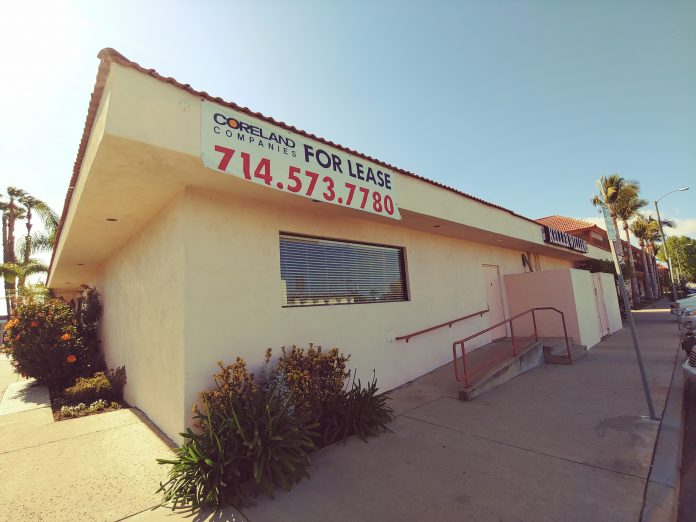By David N. Young
Following a long and sometimes contentious appeal that examined the city’s outlook for business development, the city council voted unanimously to back its planning commission, which in January had denied the request for a conditional use permit for a medical office.
In an appeal procedure rarely used, attorney Peter Blied, representing North County Consulting, presented his extensive case for reversal of the decision to the Los Al council at their last regular meeting.
City attorney Michael S. Daudt repeatedly reminded the council that the public appeal was not a rehash or review of the planning commission’s action but was instead an opportunity to “put fresh eyes” on the proposal.
Blied said the building in question, located at the Town Center, 10900 Los Alamitos Boulevard, had been vacant for over three years, so the city should be anxious to see the owner lease it.
City officials, meanwhile, contended the lease may not meet the preferred use of the space (according to its General Plan) and moreover, the proponent’s refusal to share details cast a doubt on its long-term impact to the area.
Interestingly, the city’s staff had initially recommended approval of the CUP, but, according to the minutes of the January planning commission meeting, the shroud of secrecy surrounding what type of medical office group would move into the space ultimately outweighed the recommendations for approval.
“The owner does not want to reveal the potential medical office lessee,” according to the official minutes of the Jan. 27 planning commission meeting. Therefore, the commission “did not have an adequate understanding of what the ultimate effect of this unknown business would be on the (surrounding) shopping center.”
In fairness, the staff recommended approval “unless additional or contrary information is received during the hearing.” Johnston said later that despite the recommendation, they did have “reservations.”
Blied told the council that he was acting on behalf of a proposed medical office group formally appealed the denial of a conditional use permit by the city’s planning commission, presenting a number of reasons to the council why he felt it should be approved.
“The proposed medical office complies with all applicable requirements,” said Blied in his appeal, adding that the proposed lease “supports all required findings for a conditional use permit as provided in the Los Alamitos Municipal Code.”
While he commended the “volunteer work” on behalf of the commission, he suggested their vote to decline the permit was “myopic” or “focused on the wrong things.”
Nevertheless, while Blied made a detailed presentation regarding the proposal by the “regional medical group,” he refused to name the group nor would he reveal any details of the proposed operation.
If the group’s name were divulged, said Blied, “you would recognize it.” Although he said the potential client would be willing to prohibit medical uses such as “urgent care,” he repeatedly said he was not authorized to divulge more specific operational detail.
Council members Richard Murphy and Mark Chirco, in separate questioning, tried many times to extract more information from Blied. Both men proposed hypothetical conditions under which, in their thinking, would lessen the risk the council would be taking if they knew more about the proposed operations.
Although Blied did offer to take some of the proposed scenarios to the prospective medical group, he consistently deflected attempts to reveal additional information.
“The term medical is very broad,” said Chirco, suggesting there were at least 20 or more types of “medical” office possibilities.
Mayor Chirco also questioned that if the owner was having a hard time leasing to a retail tenant, had they not considered making modifications to the building to make it more attractive for such uses?
Warren Kusumoto went a step further to suggest perhaps if the building’s owner could not rent to retail, perhaps he should consider lowering the rate or other changes to accommodate retail operations.
Blied said the building had no loading docks and was oddly configured, making it unattractive to retail use. Further, he brought up Amazon and online shopping, saying the “trend for brick and mortar stores are going down.”
“I do a lot more online shopping,” said council member Shelley Hasslebrink, “but I still need a place to eat. We need gathering places,” she said, suggesting the city was “being swallowed up” by medical offices.
More to the overall point of approving the conditional use permit, she suggested “it could be unfair” to nearby businesses and to local citizens to approve the permit without knowing more about the project. “Once we approve the conditional use permit, we lose all control,” she asked?
Daudt said there were some examples of limits and Blied suggested if the office became a “nuisance”, the city could take enforcement action.
“We don’t know what kind of medical practice it is, how many employees, hours of operation. We have to be fair to our neighborhoods and business,” said Hasslebrink, adding she preferred to stick to the city’s general plan for retail development.
“We don’t want to become a city of medical offices,” echoed Murphy. He too suggested they stick to the city’s general plan, which designates an area for medical offices.
Even though there are currently two medical offices within the complex, city staff told the council they are a dentist and a chiropractor and have both been there for a very long time.
Ultimately, Hasselbrink moved to uphold the planning commission’s decision and deny the request from the undefined medical group for a conditional use permit.
The Council voted 4-0 to deny the permit.
Council member Dean Grose did not vote, having recused himself to avoid any appearance of a conflict of interest. His wife Wendy is a member of the Planning Commission and had voted on the permits when they came before the commission in January.

